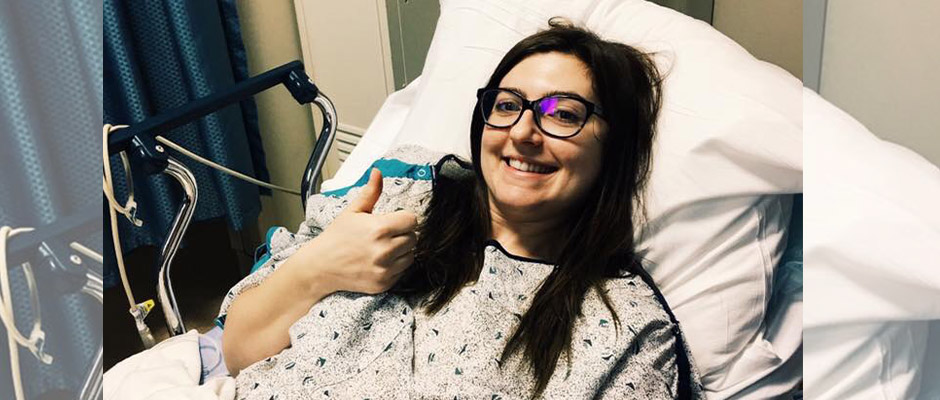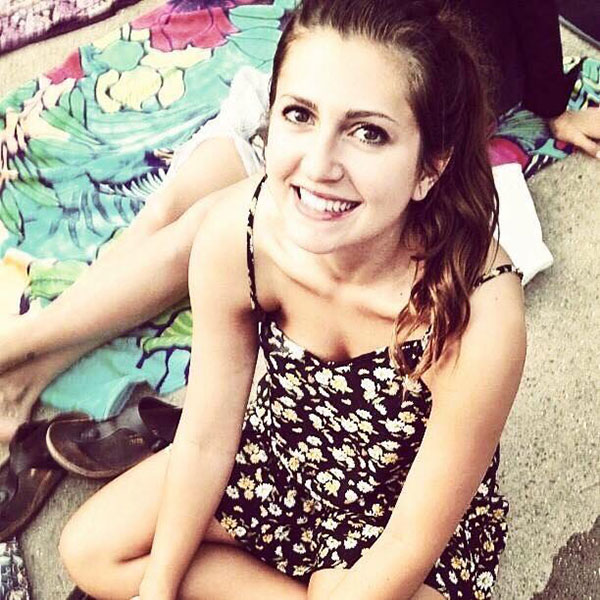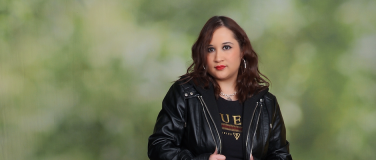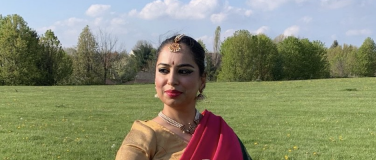
By Jessica DiBernardo
Endometriosis is the mysterious health disease that affects one in 10 women. It is a condition in which tissue, similar to the lining of the uterus, grows in other areas of the body (Ruggeri, 2015.) There is no cure. There is no specific known reason of why it develops. It just is.
But I refuse to accept that.
My name is Jessica DiBernardo. I am a 25-year-old woman with endometriosis, and this is my story.
The first time I got my period, I was 12 or 13 years old. It was right before basketball practice. My friend, my mom, and I were getting ready to head out, and I quickly ran to the bathroom. There was blood. I was mad and did not want to go to practice. Why was I mad? Because getting your period for the first time was also referred to as getting “the curse.”

We teach adolescent girls at a young age that their periods are disgusting, unlady like, smelly, messy, gross, and that getting “the curse” would be a terrible time. Thanks society. Girls, ladies, do not be ashamed of your bodies and your natural flow. It is beautiful, and I know this now.
So, I went to practice, because just like now, my period was something that happened. I had to suck it up and get on with my life. I felt weird, because I usually loved being at practice.. However, I found myself wanting to be home, in my room, by myself.
The nurses’ offices in school would basically become my second home growing up. Constant nausea, cramping, gas pains, all gastrointestinal issues. I felt sick almost all the time. My mom took me to the ER multiple times for cramps so severe that I couldn’t even walk without being bent over at a 90 degree angle. It didn’t matter if I was on or off of my period, the cramps continued. Once, when we went to the ER right after my field hockey game, we figured I was just cramping from playing too hard. Well, sure, that was true, but it was not just physical exertion causing it. It was because endometriosis has been growing inside of me since I was very young. I started hormonal birth control when I was 14, primarily for my acne, but also to “tame” my periods.
During my teenage years, the illness continued. I was still social, an athlete, active, and fairly popular; but I always felt off. I felt like I could cramp up at any moment, which ignited my anxiety. As we continued to see doctor after doctor, they all insisted on putting me on an antidepressant. We denied all of these suggestions; I knew this was not the issue. When I was 18, I went through a period of extreme fatigue; I could sleep for days, yet I would still be exhausted. It took multiple doctors and tests to figure out I had Hashimoto’s Hypothyroidism. I also had a barley allergy. Goodbye gluten! There it was! We had the answer. So we thought.
But did you know hypothyroidism could be connected to endometriosis?
Endometriosis symptoms can be misdiagnosed as other diseases. For instance, I was diagnosed with irritable bowel syndrome after having an endoscopy where everything showed up normal. For years I took IBS medication, cut foods from my diet, and yet still every day felt the same. Endometriosis symptoms include but are not limited to painful periods (also known as dysmenorrhea) or irregular periods, painful intercourse, increased pain during bowel movements, increased pain during urination, excessive bleeding, spotting and bleeding between cycles, painful digestion, constipation, nausea, chronic lower back and abdominal pain, pelvic pain, infertility, joint pain, nerve pain, chronic fatigue, bloating (Ruggeri, 2015.)
For some women, these symptoms occur during their menstrual cycle. For other women, it occurs also during ovulation. And yet for others, it is present every day of their lives. For me, painful bowel movements, painful digestion, extreme nausea, abdominal pain, pelvic pain, chronic fatigue, and bloating where symptoms I experienced daily, and for years. I also had chronic yeast and bacterial infections. When doctors told me nothing was wrong with me, it would send me into a downward spiral. I thought, How can I be feeling so terribly ill, and yet have medical professionals tell me nothing is wrong?

For more than three years, I reported my symptoms to my OB/GYN. We tried numerous birth controls and did countless ultrasounds. I was told that painful sex was due to not being wet enough, because of something in my mind holding me back. I would go home and cry. How could the feeling of a knife stabbing into me and then being penetrated by sandpaper be in my head? It wasn’t. When my doctor touched my cervix, blood would gush out of me and onto my legs and my feet. I had chronic yeast and bacterial infections, and my pelvic exam made me yelp in pain on my left side...yet, nothing was wrong.
One day, just two months ago, I had a day of cramping so terrible that I had to leave work. I called my OB/GYN’s office, hysterical to get an emergency appointment. They told me to go to the ER. I yelled, I screamed, I cried, and I didn’t care what they thought of me. They got me an appointment within 48 hours.
The doctor spent approximately 90 seconds examining me before we went to his office. He explained I had a few options: another different birth control, an IUD, hormone control for endometriosis (to just “see” if that helps), or surgery. I said yes to surgery. There was no doubt in my mind I had endometriosis, and it had to be surgically removed. He agreed, explained what would happen, and scheduled my laparoscopy and hysteroscopy for less than a month later.
Those few weeks before surgery were hell. I was so exhausted, my illnesses caught up to me, and I felt like I could barely function. It was like I was finally going to have the answers I deserved, but my fear would be that the diagnosis was what it had always been: nothing is wrong. Between my normal pain and the stress, I was a total mess. The only thing I could do was my normal routine: put on a smile and pretend that my insides didn’t feel like they were slowly murdering me. Just another day in the life.
The day before surgery, my grandma came to Pennsylvania from Florida to take care of me, and thank God she did, because post lap and hysteroscopy was more intense than I’d ever thought. We arrived at the hospital at 6 A.M. I changed and was prepped, with the IV in the top of my left hand until about 8 A.M. I told my grandma, “If I come back and the results are nothing, I am checking myself into a psych ward.”
A few different doctors and nurses came to ask me questions; it felt like I was in a haze. I was rolled into the operating room, which is still a little fuzzy, but I remember being lifted from my bed to a table, and then I remember nothing until waking up. I woke up in a room with other people, and I was freezing. I mean, my entire body was shaking. I was so cold. I could barely talk. My throat was killing me. I later learned there was a breathing tube in my throat. I whispered as loud as I could to the nurse passing by that I would like more blankets. She kindly brought me warm blankets, but I was still freezing. I dozed off and later woke up in the cubicle where I started with my grandma at my side. It was past 10 A.M., so my surgery had taken over an hour. I was so tired, my body was so sore, I was so cold. Nurses came to check on me as I continued to doze off. We waited for more than two hours, and finally, the doctor came in.
“Almost everything looked perfect, except for the endometriosis we found,” he said. “We found some on the right, and much more on the left. We excisioned it out.” And he left. I had the answers, but he didn’t explain where it was, what stage it was, how much there was, how I should recover, nothing. I felt relieved to have answers, but I also felt alone. Now what? How do I battle this? Well, at the very least, at that moment, I knew I wasn’t crazy. My symptoms were real, and I smiled to all of the doctors who told me it was all in my head.
I stayed in the hospital until about 3 P.M. I tried to eat some crackers and drink water, but I could barely lift my arm and my throat had an indescribable amount of soreness. I slept and slept. A nurse named Olivia, truly the best nurse I have ever had, checked my pad (which I didn’t even know I had on) because of the hysteroscopy bleeding. She gauzed my belly button (they went in through my belly button and lower abdomen). She helped me walk around, which was so difficult. I had to urinate before being released, and I couldn’t do it. It was so painful and difficult. She put fluid into my IV to help, but still it took more than three hours. Finally, I had to pee! Something I never thought I’d be so excited about. There was blood in my urine, and my stomach ached as I went, but that was my first post-op accomplishment. I was released shortly after and was wheeled downstairs.
The first week of recovery was more than I bargained for. The gas from the carbon dioxide inflated through my chest and shoulders, making everything uncomfortable. My incisions were so sore. You really don’t know how much you use your core for every movement until you can’t use it anymore. I would try to walk across my house once a day for a few days to keep the gas moving. I worked from home that week, and that was my first mistake post-op. I thought I’d be fine. I pushed myself too much, and the next week I had to take off, which I should’ve done in the first place. So a piece of advice to you: this is not easy. Take off of work and rest. The second week, when my grandma went back home, wasn’t as bad as the first week, but it was still difficult. In fact, I am now four weeks post-op, and it is still difficult. My incisions are still sore, and walking more than a block will have my stomach in a knot. Some women recover in days, some in weeks, some in months. Do not compare yourself to others. I’ve been told, “You should feel better by now.” Well, gee, after years of suffering from pain, then a surgery, excisions, and recovery, I sure as hell think my body is entitled to take as long as it needs to recover, regardless of anyone’s opinion.
For years, I did not enjoy my life. I could not participate in things I used to love. I would throw up randomly. I would be nauseous traveling. Concerts started to give me anxiety. The grocery store gave my panic attacks. I stopped going out. The fear of the pain I felt everyday at any time was enough to make me feel like I was dying. Friendships were lost and broken. I did not want to leave my house. I never felt well. I did not want to talk about it, to anyone, because I did not want to sound dramatic. Doctors made me start to believe I was depressed. But I had a gut feeling that there was more to it. The cramping I experienced that kept me in bed for days and caused me to become antisocial and lethargic was more than what the doctors were telling me. I found joys in life, but from the comfort of my bed with a heating pad and boxes of Zofran. It felt like someone took my life away and would never give it back. This is undiagnosed endometriosis.
Coping with endometriosis has not yet processed with me. I have therapy starting next week for my anxiety and OCD, but also to learn how to cope with chronic illness. There are no answers, there is no way to prevent it from growing back, there is no way to know. I find that terribly difficult to understand. Why is this disease so under researched? Why do doctors take seven to 10 years to diagnose endometriosis? Why are our symptoms ignored time and time again? To that, I say time is up. As endometriosis warriors, we must raise our voices and teach about this incurable, non-understandable disease, and demand more research, more understanding, more specialists, and more attention for a debilitating disease that doctors refuse to dignify. I am with you sister. We will figure this out, together. As I continue on this journey, I will update you every step of the way.
References: https://draxe.com/endometriosis-symptoms/
Editor's note: Would you like to contribute to EndoStories? Click here to learn how to submit your work.
*Patient stories submitted to Endofound.org are the views of the patient and not necessarily those of the foundation.









